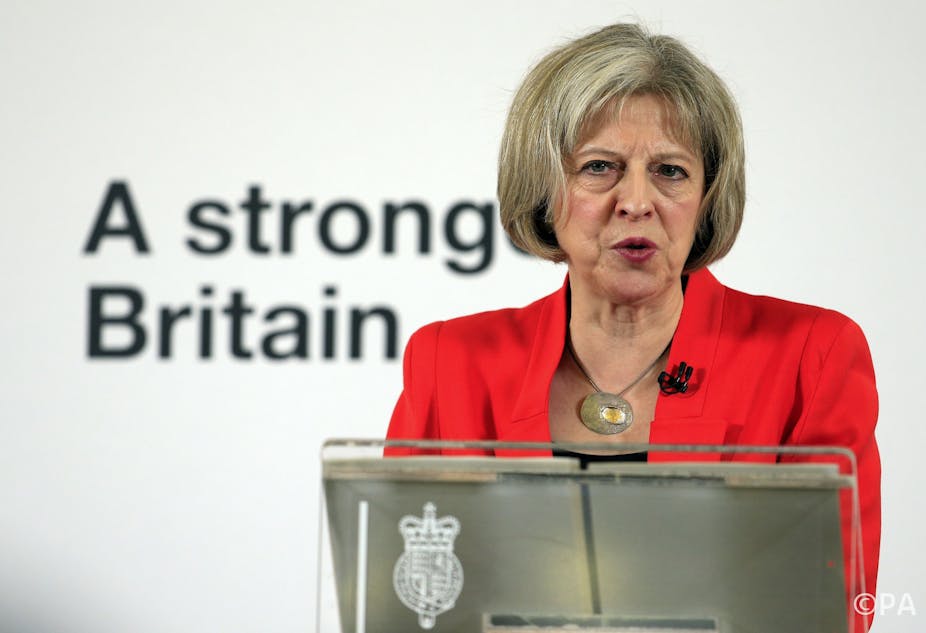In a recent speech outlining Britain’s anti-extremism strategy entitled A Stronger Britain, Built On Our Values, the home secretary, Theresa May, identified five “British values” that “are the means by which we have made our multi-racial, multi-cultural and multi-religious society succeed”.
It is telling that nowhere in the speech did she acknowledge that Britain is, always has been and is likely to remain a multilingual society.
May returned to a well-rehearsed trope for politicians from across the political spectrum that to be British is to speak English. She now joins former Labour home secretary David Blunkett – who famously equated not speaking English at home with “the schizophrenia which bedevils generational relationships” – in putting language at the centre of the debate about the role of language in modern Britain.
Announcing a “step-change in the way we help people to learn the English language” she (re)announced “penalties” for people who did not learn English – a reference to the chancellor George Osborne’s announcement of benefits cuts for those same people in the 2013 spending review. She also announced a “sharp reduction in funding for translation services”, and a “significant increase in the funding available for English language training”.
Demonising translation
Much has been made of the cost of translation and interpreting services provided by local authorities. In 2013, the communities secretary, Eric Pickles, lambasted such services as “a very expensive and poor use of taxpayers’ money”. Some right-leaning newspapers, such as The Telegraph and The Daily Mail have carried sensational stories detailing particularly egregious-sounding tales from a Bangladeshi interpreter being paid £126 for ten minutes of work in a hospital or a police force spending almost £7m on “mostly Romanian” crime suspects.

It’s worth thinking about this spending in the context of May’s emphasis in her speech on those core British values of “the rule of law”, “participation”, “equality” and “respect for minorities”.
One of Pickles’s spendthrift targets was Labour-controlled Southwark – and, in response to his swingeing attack, Richard Livingstone, a member of the finance committee, hit back pointing out that:
Sixty-nine percent of our translation costs go on social services, particularly in relation to safeguarding vulnerable people … If a social worker needs to communicate with a mother over the safety of her child, that social worker can’t say ‘go away and learn English and I’ll come back in six months’.
Inherent hypocrisy
So it would be hypocritical to really claim “regard for the rule of law” as a core British value and then allow defendants to take part in a process they do not understand. Let alone support non-English speaking victims of crime seeking justice in our courts.
David Jones, a GP, has argued that translation services are a good use of money. Writing back in 2007 in the British Medical Journal he argued:
In my practice in Tottenham, a deprived inner-city area of London with a diverse population of new migrants to the UK, like all GPs, I often care for three generations. It seems completely unrealistic to expect, for example, a 76-year-old Somali woman, often with no previous formal education, to attend English classes and acquire English. Such patients, who may expect to live for 20 years, will always need an interpreter. Her daughter struggles a bit, and we often use an interpreter, usually via the telephone. Her granddaughter, aged 10, is of course effortlessly bilingual. We need to take a long view sometimes.
His point about which groups of people are accessing translation services is well made. It is largely older, poorer, less educated women who often have little experience of English who depend on these services. Studies from the US have shown that patients with limited English are more likely to suffer physical harm from adverse clinical interventions. According to Zurich-based health researcher Alexander Bischoff: “foreign-language patients who have access to professional interpreters have improved outcomes, for example, less hospitalisation, better chronic disease outcomes, and lower health care costs.”
Desire to learn English
By emphasising that immigrants should learn English so that translation services aren’t actually required in the first place, May is pushing at a wide open door: the vast majority of immigrants are very keen to learn English as quickly as possible. This can be seen in the success of government-funded adult English classes.
So great was the demand in the eight years between 2001-2 and 2008-9 that the Labour government had to treble spending on English for Speakers of Other Languages courses to £300m over that period. And in 2005 they took the decision to start charging anyone who wasn’t on Employment and Support Allowance or Jobseeker’s Allowance benefits. In this context, Osborne’s threat of: “If you’re not prepared to learn English, your benefits will be cut” sounded as hollow in 2013 as Theresa May’s rehash of it does now.
Costs of classes vary depending what’s on offer, but an intensive one-year course of 15 hours a week could easily cost more than £1 000. According to National Association for Teaching English and Community Languages, funding cuts since 2011 have resulted in a 42% drop in the number of migrants able to access an English language course in the UK, down from 82,900 in 2012-13 to 48,300 this academic year. And a survey in May 2014 suggested providers had waiting lists of up 1,000 potential student, meaning that many of those desperate to learn English are being turned away.
Perhaps the real issue at the heart of May’s latest intervention is the unease our politicians and some of our media seem to have with the multilingual society we inhabit and its conflation with the problem of extremism. We can’t claim to respect minorities if we don’t respect their right to use their own language.
Next read: The spectre of ‘British values’ and education policy

